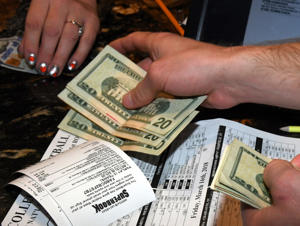
© Provided by KRON San Francisco Sports gambling in California: How are Prop 27 and Prop 26 different?
SACRAMENTO, Calif. (KRON) — Proposition 27 and Proposition 26 ads were hard to miss on television this summer. Why are two sports gambling measures on the November ballot?
Sports betting – minus horse racing – is currently illegal in California.
The two propositions will ask California voters essentially the same question: Should sports betting be legalized? Boiling the two propositions’ differences down, Prop 27 would allow online sports betting everywhere, while Prop 26 would allow gamblers to place bets in person at Native American tribal casinos and four horse racing tracks.
Prop 26 is backed by Native American tribes, while online gaming companies are pushing for Prop 27.
“A coalition of tribes spent more than $30 million to qualify a measure (Prop 26) that would allow for in-person sports gambling at reservation casinos and horse racing tracks. A coalition of online sportsbooks, like FanDuel and Draftkings, along with Las Vegas casinos are bankrolling a measure (Prop 27) that would allow Californians to place bets through their computers and mobile apps,” Politico wrote.
Proposition 27
Prop 27 would allow tribes, as well as gaming companies who make deals with tribes, to offer mobile and online sports betting for adults 21 and older. Large gaming companies such as DraftKings would be first in line to make a deal with one of California’s 79 tribes.
The proposition would legalize betting online for athletic events (such as NFL football games), and some non-athletic events (such as video game competitions). However, it bans bets on certain events, such as high school sports games.
Tribes and gaming companies alike would be required to pay taxes to California for online sports bets made. An analysis conducted by state officials estimated that taxes and fees would equal hundreds of millions of dollars each year. That money would be dedicated to funding programs for homelessness and gambling addictions, as well as funding Native American tribes that do not partake in sports gambling.
YES / NO STATEMENT
“A YES vote on this measure means: Licensed tribes or gambling companies could offer online sports betting over the Internet and mobile devices to people 21 years of age and older on non-tribal lands in California. Those offering online sports betting would be required to pay the state a share of sports bets made. A new state unit would be created to regulate online sports betting. New ways to reduce illegal online sports betting would be available.”
“A NO vote on this measure means: Sports betting would continue to be illegal in California. No changes would be made to the way state gambling laws are enforced.”

© Provided by KRON San Francisco FILE – Winning bookmakers betting tickets at Ascot Racecourse on September 03, 2022 in Ascot, England. (Photo by Alan Crowhurst/Getty Images)
Proposition 26
Prop 26 allows racetracks to offer sports betting to people 21 years of age and older. All bets must be made in-person at the track. The proposition also requires that racetracks pay the state 10% of sports bets made each day. These payments would go into a new California Sports Wagering Fund.
In addition to in-person sports betting, Proposition 26 changes the California Constitution to allow roulette and games played with dice at tribal casinos.
Proposition 26 would generate tens of millions of dollars annually for state revenues, according to an analysis by state officials. It requires that CSWF revenues be considered state tax revenues to calculate the minimum amount of spending on K-12 schools and community colleges each year. This means CSWF money would first be used to help meet this required spending level on education.
The proposition requires that money from the fund next be used to support state regulatory costs. Remaining money would go to the state’s general fund, as well as to programs addressing gambling addiction, mental health, and gambling enforcement.
YES / NO STATEMENT
“A YES vote on this measure means: Four racetracks could offer in-person sports betting. Racetracks would pay the state a share of sports bets made. Tribal casinos could offer in-person sports betting, roulette, and games played with dice (such as craps) if permitted by individual tribal gambling agreements with the state. Tribes would be required to support state sports betting regulatory costs at casinos. People and entities would have a new way to seek enforcement of certain state gambling laws.”
“A NO vote on this measure means: Sports betting would continue to be illegal in California. Tribal casinos would continue to be unable to offer roulette and games played with dice. No changes would be made to the way state gambling laws are enforced.”
Copyright 2022 Nexstar Media Inc. All rights reserved. This material may not be published, broadcast, rewritten, or redistributed.
For the latest news, weather, sports, and streaming video, head to KRON4.
